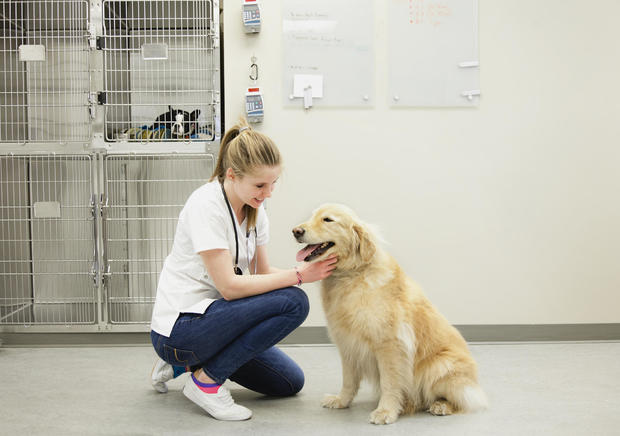How to get the best pet insurance for dogs, according to vets
Pet insurance can help you cover the costs of caring for your dog, particularly if an emergency situation arises. Much like human insurance does, these plans cover a portion of the medical expenses if your pet is diagnosed with a sudden illness, needs surgery, or has another urgent situation. In some cases, they may even cover preventative care, too.
Not all pet insurance plans are created equal, though. If you want to make sure you're getting the absolute best pet insurance policy for your dog then it first helps to know what veterinarians recommend.
Start by getting a free price quote so you know what to expect.
What veterinarians say you should do
Here are four things veterinarians recommend you do when insuring your dog.
Purchase early
When it comes to getting pet insurance for your dog, timing is of the essence — both for coverage purposes and for minimizing your costs.
"The best time to purchase a pet insurance policy is when you first obtain the dog, whether as a puppy or an adult," says Jamie Whittenburg, veterinarian director at SeniorTailWaggers.com. "Pet insurance typically does not cover any pre-existing conditions. You need to have a policy in place before your dog has any medical issues diagnosed."
Your timing can have a big influence on what you pay for your pet insurance policy, too, as premiums go up considerably with age. According to Pawlicy Advisor, a pet insurance marketplace, the average premium for a six-month-old puppy in Texas is $38.51 per month. At 5.5 years old, though, the premium jumps to $47.94 — $9.43 more per month and $113.16 more per year.
"There is no certain age where it is too late, but premiums increase with age and many things may not be covered for an older dog with previously documented health issues," Whittenburg says.
Don't let that discourage you, though, if you have an older dog. While premiums can be higher, pet insurance may still save you significant cash should an emergency occur.
"As dogs age and their medical histories become more complex, premiums go up and coverage goes down," says Rebecca Greenstein, veterinary medical advisor at Rover. "However, given the rising and often astronomical costs of emergency veterinary care, I still believe insurance in older pets has some value — and I'd discourage pet parents from cancelling existing policies in older patients just because they seem healthy."
Get a pet insurance quote in 30 seconds here now to learn more.
Know your dog
Understanding your dog's unique nuances can help you get the best coverage for them, too. As Antje Joslin, veterinarian for Dogtopia, explains, "What coverage is right for your dog varies widely based on their breed, age, health."
Some breeds, for example, are predisposed to certain medical conditions, while others are more prone to injury.
"Pet insurance may be more valuable for certain breeds, but often it is also more expensive to purchase," Joslin says. "With the rise in popularity of breeds such as Frenchies, English bulldogs, and pugs, many owners find themselves spending a lot of time and money at the veterinarian due to some breed-related medical conditions. It is a good idea to look into pet insurance any time you are considering a new pet and research the breed and associated general health and medical conditions."
Knowing the issues your pet may be prone to develop is critical when shopping for a policy, as many will exclude certain conditions. You'll need to shop carefully to ensure your policy will extend to the issues you can expect — and get coverage early before those conditions can develop.
Younger dogs and more active ones are important to insure early and thoroughly, too, as they're often more prone to injury than other animals.
"Don't think because your dog is young that he won't need insurance," Joslin says. "Often young dogs are the ones that end up in the emergency room with ingested foreign bodies or dog bite wounds from a play date at the park gone wrong."
Check with your shelter or breeder
There are many places you can buy pet insurance – including designated pet insurance providers and big-name insurance companies (like Progressive, for example).
You might also be able to purchase policies through the organization you found your dog. As Joslin explains, "Any time you get a new pet in your family, it's worth investigating pet insurance. Some breeders, larger shelters, and AKC registration now include a free or low-cost introductory pet insurance offer to get you started."
If you're a part of any groups or organizations, explore possible options through there, too. Costco members, for example, can use their membership to purchase certain pet insurance plans. So can AARP members.
Understand coverages
Understanding your budget for veterinary costs, as well as what expected costs you might come across with your pet, is important as you shop for insurance, too. If you have little in savings, for instance, you'll want a plan that's more comprehensive — likely one that covers both accidents and injuries (and maybe even prevention). If you have the funds to cover unexpected costs (just not thousands and thousands of them), an accident-only plan may work.
"Some people budget for their pets' annual exams, vaccines, medications, and dentistry needs and are looking more for coverage in case of an unexpected large emergency," Joslin says. "Some people like to have plans that cover everything including routine preventative care. Use your own personal financial situation to guide your decision-making."
You should also research the costs of conditions your dog may develop. If they're prone to broken bones or other orthopedic issue, you'll want to look at policies with high maximums there. Look at lifetime maximums, too, Greenstein warns, as these could limit the care your pet can get if a condition develops.
"I am also wary of any policy that puts a cap on the lifetime maximum amount paid out for a particular category of medical condition," Greenstein says. "If you have a pet with a heart condition, lifetime medical care and follow-ups are often needed, so a restrictive policy would be the last thing you would ever want."
What veterinarians say you shouldn't do
Here are four things veterinarians recommend you avoid when insuring your dog.
Choose the first insurer you find
Finding the best pet insurance policy for your dog takes time, so don't rush into the first policy you come across. Compare insurers, plans, costs and coverages, and make sure you're getting the absolute best fit for your animal.
"The cost of pet insurance varies from company to company, so do your research," says Autumn Madden, veterinarian at Chewy. "It's important to not limit yourself to one or two quotes when looking for coverage. Some factors that may influence quotes include the breed, medical history, and age."
You should also be prepared with your pet's medical records — both to inform your research and to provide to insurance providers when shopping policies.
"Some insurance companies require full history from hospitals your pet has been to and will determine coverage from your pet's medical records," Madden says.
Use the below table to easily shop some of the top pet insurance providers on the market.
Fail to read the fine print
Before you finalize a pet insurance policy, make sure you understand it in detail. First, is there a waiting period?
"Most insurance companies have a waiting period before you are eligible to make a claim for your pet," Madden says. "Because of this, it is important to start looking for coverage as soon as you schedule that first vet visit."
Also, are there exclusions? Does it work with all vets? Are pre-existing conditions covered?
"The most common mistake I see is that owners don't fully understand the policy, especially the pre-existing condition clause," Whittenburg says. "Often a pet will be diagnosed with a health condition, which is what prompts the owner to seek insurance. Unfortunately, because it has been previously diagnosed, the condition and its treatment are not covered."
Finally, how does the process actually work? Do they pay the vet directly, or do you get reimbursed after services are provided? Is there a claim filing process you need to follow? Understand how you'll put the policy into use should you buy it.
"When comparing policies, it's very important to read the fine print and see what they will cover, how they will reimburse, what forms or paperwork you need to submit, and when you can expect reimbursement," Joslin says.
Wait until there's a problem
Pre-existing conditions can make your pet's policy more expensive or exclude them from coverage altogether, so don't wait until they're injured, develop allergies or have some other chronic issue before getting insurance. If that happens, insurance may no longer be worth it at all.
"Insurance is not always helpful for a pet that has lots of pre-existing conditions as those are typically excluded from coverage," says Sarah Gorman, managing veterinarian at Small Door Veterinary. "It's not so much an age where things are not worth it, but after several pre-existing conditions, it may not be."
The same goes for injuries, too. If your pet has a broken leg, you likely can't apply for pet insurance after the fact and have it cover the treatment. "Typically there is a 30-day waiting period for insurances," Gorman says.
Going with the cheapest plan
Everyone wants to save money, but cutting corners on pet insurance could cost you if an emergency crops up. Lower-cost plans tend to have smaller policy limits and offer a lower reimbursement rate for covered treatments and services. They may also exclude more conditions.
"A lower monthly payment is very attractive from a budgeting standpoint, but these sorts of policies often have a higher deductible, which means you have to pay a more significant sum out-of-pocket before insurance coverage kicks in," Greenstein says.
It's also important to consider the rising costs of vet services when weighing the premiums a plan comes with. According to research from the Associated Press, vet costs have jumped 10% in the last year. A good pet insurance plan can help you offset these costs and better weather an emergency.
Get a free price quote here now and learn more.
An alternative
Though the veterinarians we talked to all recommend having some form of pet insurance, not all pet owners can afford it. If you're in this boat, consider setting up a savings account for your pet. This can help you cover routine care, as well as any unexpected costs should they arise.
"After 22 years of practicing veterinary medicine, I've never had a single pet parent say they regretted having insurance," says Katy Nelson, senior veterinarian at Chewy. "I've only heard pet parents saying how happy they were that they had it when something terrible occurred or how they wish they had it so they could afford the care that was being recommended at the time of an accident or illness."
You should also focus on prevention with your pup — getting them the annual exams, vaccines, and heartworm preventatives they need before conditions can develop.




